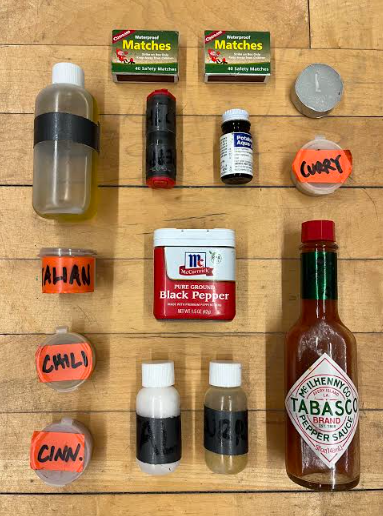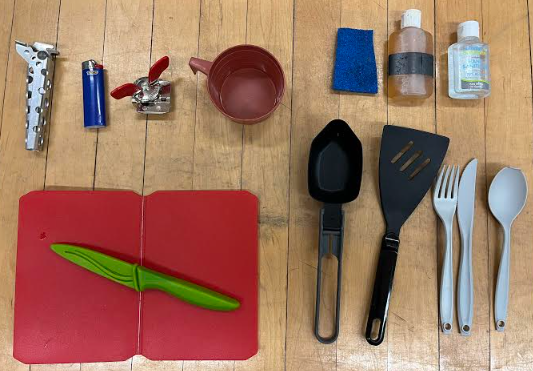Food and Recipes
Your body is your most essential tool to staying safe and recreating in the backcountry. You need to fuel it with the essential nutrients it needs to continue functioning.
At the end of the day you should pack foods that you enjoy eating and know work well with your body. Keep in mind these macronutrients and tailor them accordingly to your adventure based on number of days, weather conditions, pace, and how hungry you usually are!
Macronutrients
- Carbs: this is your fast energy source, eating foods high in carbs will give a short burst of instant energy
- Simple: (ex. Sugar, white bread, cookies)
- Quicker to digest
- Immediate energy
- Complex: (ex. Whole wheat bread, oats, other grains like rice)
- Longer lasting energy
- Fairly nutritious
- Simple: (ex. Sugar, white bread, cookies)
- Fats: this is your second energy source, it becomes important to eat good fats when you are doing low intensity activities for longer periods of time (ex. backpacking) or winter activities (ex. Winter camping) when your body will be burning more calories to stay warm.
- Protein: this is your reserve energy, providing muscle recovery, and keeps you feeling full. There are two types of protein:
- Complete: (contains all 9 amino acids)
- Beef
- Fish
- Eggs
- Incomplete: (does not contain all 9 amino acids)
- Broccoli
- Nuts
- Brussel sprouts
- Complete: (contains all 9 amino acids)
Hydration:
This is key to functioning during outdoor sports, without hydration your body function will degrade quickly. Drinking water throughout your adventure is essential to keeping the body functioning properly.
- If hydration needs are not met, health issues like this can arise:
- Muscle cramps/stiffness
- Decrease in performance
- Headaches, nausea, and vomiting
- Loss of mental state
- Electrolytes: replenish the essential minerals that are lost through perspiration during outdoor activities.
- Ex. sodium, magnesium, potassium and calcium
- A lack of electrolytes can cause a multitude of health issues:
- Headaches
- Muscle cramps
- Degradation of mental state
Buying Food:
There are lots of pre-dehydrated or freeze dried backpacking meals available for purchase, however these can be really expensive. Here are some cheaper options for foods that are easy to make in the backcountry with not a lot of preparation:
- Oatmeal packets
- Just add water pancake mix
- Canned soups
- Ramen Noodles
- Spaghetti/pastas
- Mac and cheese
- Hot dogs/Veggie dogs (easily made over a fire)
How to make a spice kit
To make your meals more interesting you can bring extra spices to add to your food. You can either purchase small containers of spices or put spices into labeled bags. Some popular spices you may consider bringing are:
- Olive Oil (not a spice but this can be good to keep in your kit)
- Salt
- Pepper
- Garlic Powder
- Onion Powder
- Ginger
- Cumin
- Curry
- Cayenne
- Chili Powder
- Cinnamon
- Siracha (also not a spice but helps add flavor)

Making Food
There is a large variety of meals you can make in the backcountry, any dehydrated foods you can make by just boiling in water, such as rice and pasta, can be easy go-tos for backcountry meals and you can add any veggies and sauces and other add ins. Many camping foods can be made by taste and estimating ingredient amounts, however here’s a good resource for a lot of good recipes that can be made in the backcountry:
Ingredients:
- Ramen noodles (Carbs)
- Pad thai sauce
- Snow peas
- Peppers
- Onions
- Tofu or shrimp (Protein)
- Peanuts (Protein)
- Oil (Fat)
Directions:
- Boil approximately 2-3 cups of water
- Cook ramen noodles for approximately 4 minutes
- Drain ramen noodles in dishwashing station with strainer or scatter gray water
- In another pot, pour some oil and saute onions, peppers, and your protein of choice
- Add pad thai sauce and mix
- Top your pad thai with crushed peanuts and snow peas
Ingredients:
- Red lentils (Carb)
- Curry powder
- Tofu or other protein (Protein)
- Dehydrated coconut milk (Fat)
- Dehydrated veggies:
- Peppers
- Broccoli
- Onions
- Garlic
- Oil (Fat)
Directions:
- Boil approximately 2 cups of water, pour in red lentils
- Cook the lentils for about 5 minutes
- Add in another cup of water and dehydrated coconutmilk, add in curry powder
- Stir, add in dehydrated veggies
- Lastly, stir in your protein of choice
- Let simmer for about 5-10 minutes.
Ingredients:
- Boulline cubes (Fat)
- White Miso paste
- Dehydrated:
- Tofu or protein of choice (Protein)
- Mushrooms
- Seaweed
- Noodles (optional) (Carb)
Directions:
- Bring 3-4 cups of water to a boil, add in boulline cubes and white miso paste
- Add in mushrooms, seaweed and protein
- (Optional) add in noodles
- Boil/simmer for about 10-15 minutes until everything is rehydrated and cooked.
What to Include in your cooking kit
- Camp stove
- Fuel
- Cutting Board
- Knife
- Pot and pot lid
- Pan
- Utensil kit
- Spatula, spoon, pot scraper, potholder, knife, lighter/matches, soap, strainer

